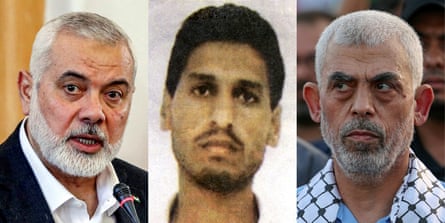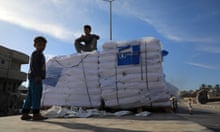Israel has urged what it called “nations of the civilised world” to refuse to implement any international criminal court arrest warrants issued against its leaders.
Karim Khan, the chief prosecutor of the world’s top court, announced on Monday that his office had applied to a pre-trial panel for arrest warrants for three senior Hamas officials, as well as the Israeli prime minister, Benjamin Netanyahu, and his defence minister, Yoav Gallant, for war crimes and crimes against humanity during the Hamas attack of 7 October and the ensuing seven-month-old war in Gaza.
What was widely interpreted in Israel as an equivalence between the named leaders of the Islamist group – Yahya Sinwar, Hamas’s chief in Gaza, Mohammed Deif, the commander of its military wing, and Qatar-based Ismail Haniyeh, leader of the political bureau – and democratically elected Israeli politicians was met with outrage by Israeli officials, the public, and the country’s allies.

On Tuesday, a government spokesperson, Tal Heinrich, said: “We call on the nations of the civilised, free world – nations who despise terrorists and anyone who supports them – to stand by Israel. You should outright condemn this step.
“Make sure the ICC understands where you stand. Oppose the prosecutor’s decision and declare that, even if warrants are issued, you do not intend to enforce them. Because this is not about our leaders. It’s about our survival.”
Khan said on Monday that Israel had the right to defend itself from Hamas, but that it did not “absolve Israel or any state of its obligation to comply with international humanitarian law”.
Whatever Israel’s military goals in Gaza, the prosecutor’s office believed its methods – “namely, intentionally causing death, starvation, great suffering, and serious injury to body or health of the civilian population” – were criminal, he added.
It has been known for some time that Khan’s investigation could result in arrest warrants for Netanyahu, Gallant and military officers. Last month, the Israeli prime minister flew into a public panic over the possibility and appealed to the G7 – and in particular the US, Israel’s most important ally – to intervene in any potential international legal action.
Monday’s statement from the chief prosecutor’s office nonetheless shocked the Israeli establishment, and has sparked a flurry of diplomatic damage control.
Israel, along with the US, Russia and China, is not a member of the ICC and does not recognise its authority. The 124 states that do, however, are obliged to honour court arrest warrants if they are issued, which could severely curtail the ability of Netanyahu and Gallant to travel abroad.
France, Belgium and Slovenia said on Monday they supported Khan’s decision, while a UK government spokesperson reiterated that London did not believe the ICC had jurisdiction in the case, and the Czech Republic called the prosecutor’s move “appalling and completely unacceptable”, a clear indication of the west’s growing divisions over approaches to Israel as death and destruction mounts in Gaza.
Israel is also worried about an immediate impact on weapons sales and the defence industry, the possibility of further sanctions if the case goes ahead, and implementing military strategy and judicial changes that may be needed in order to minimise the risk of future charges.
Asked if Netanyahu or Gallant would avoid travelling to ICC-signatory countries if arrest warrants were issued, Heinrich said: “Let’s wait and see.”
On Tuesday, Israel’s foreign minister, Israel Katz, travelled to France in a bid to contain the diplomatic fallout. It is also expected that Israel will encourage US Republicans to reimpose sanctions on ICC officials, and urge ICC-signatory allies to pressure the court into preventing warrants from being issued.
The ICC decided in 2021 that it had a mandate to investigate violence and war crimes committed by Israel and Palestinian factions in events dating back to 2014. Many in Israel have long claimed that the UN and associated bodies are biased against the Jewish state.
No leader of a “western-style” democracy has ever been issued a warrant. An ICC warrant for Russia’s president, Vladimir Putin, was declared last year, and other outstanding warrants include the Ugandan warlord Joseph Kony and the former president of Sudan Omar al-Bashir.
Khan’s office has requested the warrants for the Hamas and Israeli suspects from a pre-trial panel of three judges, who take on average two months to consider the evidence and determine if the proceedings can move forward.
In recent visits to the Egyptian side of the Rafah border crossing into Gaza, Israel and the West Bank, Khan had made clear that the scope of his office’s investigation would be expanded to include the 7 October attack and its aftermath.
About 1,200 people, mostly civilians, were killed on 7 October, with a further 250 taken hostage, and about 35,000 people have been killed in the war in Gaza, according to the Palestinian health ministry, which does not differentiate between civilian and combatant deaths.
An initial ceasefire and hostage and prisoner swap at the end of November broke down after a week, while several attempts since aimed at a new truce, mediated by the US, Egypt and Qatar, have floundered.
A return to fruitful negotiations seems less likely than ever after earlier this month Israel launched a long-threatened offensive on Rafah, the last corner of the Gaza Strip previously spared ground fighting, where more than 85% of the Palestinian territory’s population of 2.3 million people had sought shelter.
Food and medical aid deliveries through Rafah’s crossing with Egypt had been suspended due to a lack of supplies and insecurity, the UN agency for Palestinians said on Tuesday.
Fierce fighting continues across the region: Israeli forces operating in Jabalia camp in northern Gaza on Tuesday laid waste to the area with tank and aerial bombardments, residents said, while airstrikes killed at least five people in Rafah.
An Israeli raid in the West Bank city of Jenin on Tuesday killed seven people, including a doctor, local health officials said.









